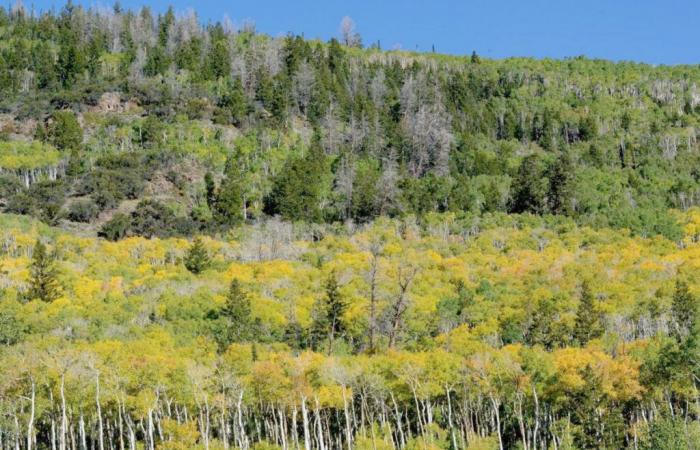
It’s difficult to imagine Pando, the largest living organism in the world: it is an immense clonal colony of 47,000 aspen trees (Populus tremuloides) connected by their roots and which extends over approximately 43 hectares in the Fishlake National Forest, in central Utah (United States).
Not only are its dimensions dizzying, but so is its age: between 16,000 and 81,000 years old, according to a DNA analysis! Making him one of the oldest living beings on Earth, if not the oldest altogether.
This estimate of Pando’s age comes as a semi-surprise, since scientists had long assumed that he was among the oldest living things on the planet, without knowing with certainty his age.
To arrive at this estimate, Rozenn Pineau, from the Georgia Institute of Technology in Atlanta (United States), and her colleagues explain, in a pre-publication on the bioRvix platform, having collected samples of leaves, roots and Pando’s bark, then extracted genetic data with a particular focus on somatic mutations, that is, changes to DNA that occur in an organism’s cells after conception. “Initially, when Pando germinated from a seed, its cells contained essentially identical DNA,” Rozenn Pineau explains to New Scientist.
But every time a new cell is produced and the genetic information is replicated, errors can occur, introducing mutations into the DNA.”
PANDO HAS BEEN GROWING SINCE THE LAST ICE AGE!
By observing which mutations were present in different parts of the tree, the researchers were able to piece together Pando’s history and estimate its age. Assuming they correctly identified every mutation in the portion of the genome sequenced, their results suggest Pando is about 34,000 years old.
However, Rozenn Pineau and her team were unsure whether they had missed some mutations or whether some of the identified mutations were false positives. Taking into account these uncertainties, these scientists estimate that the age of Pando is probably between 16,000 and 81,000 years old. “Although these scenarios give quite different numbers, they all point to one remarkable conclusion: Pando is really, really old,” says Pineau. Even if we consider the youngest estimated age (16,000 years, editor’s note), this immense clonal colony of 47,000 aspen trees has been growing since the last ice age. “This discovery fits well with other evidence, such as pollen samples taken from a nearby lake that show that aspen trees have grown continuously in this region for at least 15,000 years and have been relatively well represented over the last 60,000 years. »
Pando may even be the oldest living organism in the world. Other contenders for this title include a cloned tree in Tasmania, Lomatia tasmanica, which is at least 43,000 years old, and a patch of oceanic posidonia in the Mediterranean, which could be up to 200,000 years old.





